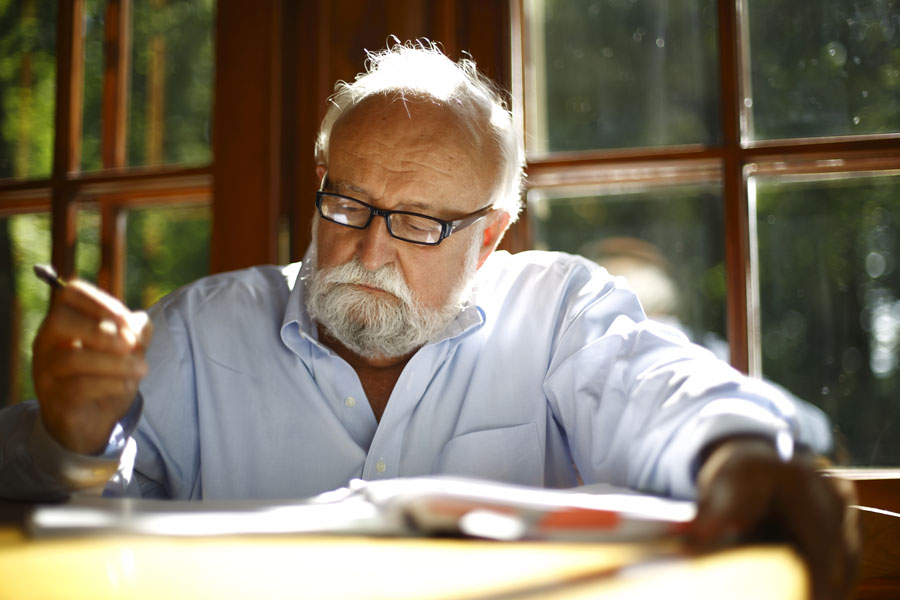Krzysztof Penderecki is a composer and conductor, born on November 23, 1933, in Dębica. He comes from a multi-cultural family with Armenian, German, and Polish roots. He started his musical training with piano lessons but was more interested in his father’s violin. As a student, he went to Kraków to study composition. Penderecki studied composition first with Franciszek Skołyszewski and then with Artur Malawski and Stanisław Wiechowicz at the Academy of Music in Kraków. In 1958, he began lecturing in composition, and in 1972, he became a professor. He also gave lectures as an assistant professor in Essen at the Folkwang-Hochschule and at Yale University. From 1987 to 1990 he was the artistic director of the Kraków Philharmonic, and since 1993 he has been the artistic director of Festival Casals in San Juan, Puerto Rico. Starting in 1997, he became the music director of Sinfonia Varsovia, and in 1998 he began advising the Beijing Music Festival. Since 2003 he has served as the Artistic Director of the Sinfonia Varsovia. He regularly works with the Polish National Radio Symphony Orchestra and Sinfonia Iuventus, the Beethoven Academy Orchestra, Sinfonietta Cracovia, and the Warsaw Philharmonic Orchestra.
Hi most successful works include Threnody to the Victims of Hiroshima (1960), St. Luke Passion (1966), Cello Concerto No. 2 (1983) written for Mstislav Rostropovich, Polish Requiem (1984), Symphony No. 3 (1995), Violin Concerto No. 2 written for Anne-Sophie Mutter (1995), Symphony No. 7 The Seven Gates of Jerusalem (1997) and the Double Concerto (2012). Also a prominent film composer, Penderecki wrote music a.o. for the full-length feature film The Manuscript Found in Saragossa by Wojciech Jerzy Has, and his work can also be found in Kubrick’s The Shining, Friedkin’s The Exorcist, The Mask by the Quay brothers and Shutter Island by Martin Scorsese.
Marta Kowalczyk was born in 1991 in Koszalin, Poland. She began her violin studies at the age of seven at the Grażyna Bacewicz School of Music in Koszalin. She later graduated from Chopin University of Music in Warsaw having studied with Jan Stanienda. Kowalczyk has also completed a Master of Arts and an Advanced Diploma in Performance at the Royal Academy where she studied with György Pauk. In 2017 she attended the Stauffer Academy, in Cremona, with Maestro Salvatore Accardo. She has been honoured with the Royal Philharmonic Society Award, the J&A Beare Prize, and the Grand Prix and two Special Prizes at the Ludwig van Beethoven International Chamber Music Competition. She has also received 1st Prize at the International Violin Competition in Bled, Slovenia, 1st Prize at the International Violin Competition in Belgrade, and a Special Prize at the China International Violin Competition in Qingdao.
The Second Violin Concerto ranks among the most persuasive of Penderecki’s concertante works. It is written in an expanded sonata allegro form, and its subtitle, ‘Metamorphoses’, is symbolic of the cyclical elements and procedures which formed the basis of the composer’s compositions for more than two decades. Penderecki began incorporating more traditional techniques into his writing in the 1960’s, though he did not abandon his avant-garde style. Like other works from this period, the Violin Concerto shows an increasing application of orthodox Romanticism. This mixing of ideas produces characteristically unique aural events, however, Penderecki has insisted that his soundscapes are not his final cause or purpose, "I am not interested in sound for its own sake and never have been,” he wrote. “Anyone can make a sound: a composer, if he be a composer at all, must fashion it into an aesthetically satisfying experience."
Jakob Ludwig Felix Mendelssohn Bartholdy was born in Hamburg on February 3, 1809, and died November 4, 1847, in Leipzig. He was a German composer, pianist, organist and conductor. His music reflects a fundamental tension between Classicism and Romanticism in the generation of German composers after Beethoven. Felix was still young when his parents converted from Judaism to Christianity and changed the family name to Bartholdy in order to assimilate into German society. Felix went by Mendelssohn Bartholdy for the rest of his life, but he privately resented the change.
Mendelssohn completed his Fourth Symphony on March 13, 1833, and the he conducted the premiere two months later, on May 13, 1833. The piece was commissioned by the Philharmonic Society of London. In October of 1830, Mendelssohn had travelled to Italy on a trip that lasted ten months and included Bologna, Florence, Rome, Naples, Pompei, Genoa, and Milan. During his visit, he attended the coronation of Pope Pius VIII and was present for the Roman festivities during Holy Week. Oddly enough, it is not until the final movement of the Fourth Symphony that there is anything acutely Italian about it. Instead, the aim of the work is to capture the composer's impressions of Italy, which he also recorded in a series of watercolours and sketches. Its composition includes elements intended to describe and create such visions as the Mediterranean sunshine, religious solemnity, monumental art and architecture, and the sweeping countryside.
Alixandra Porembski, English Language Annotator

